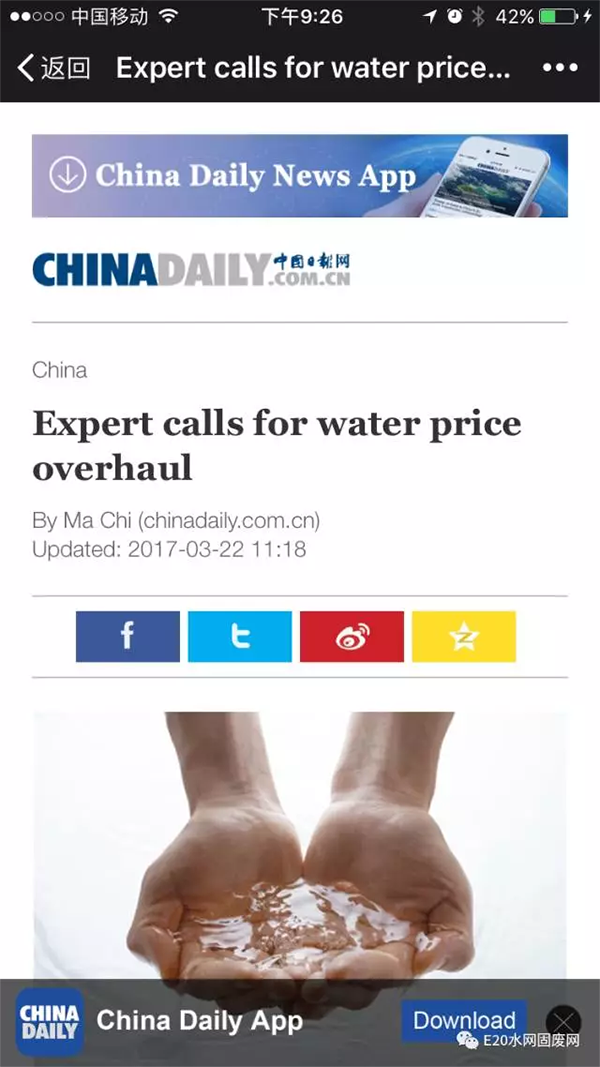時間: 2017-03-27 14:49
來源:
作者: 薛濤
人類可以通過技術來改變生態環境惡化的現狀嗎?
大的歷史維度上,人類對自然的影響是不可逆的。我們所說的生態,實際是“人的生態”,是“仿生態”。科技的進步會促進“仿生態”的實現,未來的世界會保留一些像自然狀態的小區域。技術的進步會使資源利用的效率提升,但是資源利用的強度只會越來越強。科技的進步可以使人可以和自然共存,但是不能回到真正的自然狀態。

Expert calls for water price overhaul
By Ma Chi (chinadaily.com.cn)
Updated: 2017-03-22 11:18
The current pricing system is hampering the formation of a water-saving culture in China, according to E20 Environmental Platform, an environmental protection services platform.
In China, a large portion of the water price is paid by the government, rather than the users, said Xue Tao, the deputy head of E20.
Xue said that means the general public have little awareness of the scarcity of water and leads to rampant waste.
The pricing system also stands in the way of introducing alternative water resources such as reclaimed water and desalinated sea water as users are reluctant to pay a reasonable share for what has been a public service for a long period.
"It is unfair that polluters do not bear the environmental cost while those who save water do not get any benefits," Xue said.
The same rule applies in industrial water use, he said.
"It is imperative that environmental cost is added into the production cost to increase water use efficiency."
The challenge is to upgrade the industrial sector and phase out water-intensive production, a task the government cannot perform alone and requires market forces.
A regional gap is seen in renovating the industrial sector, Xue said.
In coastal regions, such as the Yangtze River Delta and Pearl River Delta, where a large number of talents gather and high standards in environmental protection are established, the industrial sector has been largely renovated and upgraded.
It is a different case in regions such as Hebei province where traditional industries are losing momentum while new industries have not yet been established. This is related to the region's cultural and natural environments, appeal to talents, and the services provided by government.
Although home to two of the world's longest rivers, Yellow River and Yangtze River, China's fresh water resource per capita is only one quarter of the global average, according to the Ministry of Water Resources.
And the fresh water resources are unevenly distributed, with more than 80 percent in the south. In 2014, over half of the country's 600 cities faced water shortages, with more than 100 severely lacking water.
To quench the thirst of these cities, water diversion projects such as the South-to-North Water Diversion Project, have been built.
(來源:中國日報“說天下”專欄;發布時間:2017年3月23日)
編輯: 趙凡

目前在中國科學院生態環境研究中心攻讀博士學位,此前分別在武漢大學和北京大學光華管理學院獲得理學學士和工商管理碩士學位。
現任E20環境平臺執行合伙人和E20研究院執行院長,湖南大學兼職教授,華北水利水電大學管理與經濟學院客座教授,中科院生態環境研究中心碩士生校外導師,天津大學特聘講師,并兼任北京大學環境學院E20聯合研究院副院長,國家發改委和財政部PPP雙庫的定向邀請專家,世界銀行和亞洲開發銀行注冊專家(基礎設施與PPP方向)、國家綠色發展基金股份有限公司專家咨詢委員會專家庫專家、巴塞爾公約亞太區域中心化學品和廢物環境管理智庫專家、中國環保產業研究院特聘專家、中國環保產業協會環保產業政策與集聚區專業委員會委員。住建部指導《城鄉建設》雜志編委、《環境衛生工程》雜志編委、財政部指導《政府采購與PPP評論》雜志編委,并擔任上海城投等上市公司獨立董事。
在PPP專業領域,薛濤現任清華PPP研究中心投融資專業委員會專家委員、全國工商聯環境商會PPP專委會秘書長、中國PPP咨詢機構論壇第一屆理事會副秘書長、生態環境部環境規劃院PPP中心專家委員會委員、國家發改委國合中心PPP專家庫成員、中國青年創業導師、中央財經大學政信研究院智庫成員、中國城投網特聘專家等。
20世紀90年代初期,薛濤在中國通用技術集團負責世界銀行在中國的市政環境基礎設施項目管理,其后在該領域積累了十二年的環境領域PPP咨詢及五年市場戰略咨詢經驗,曾為美國通用電氣等多家國內外上市公司提供咨詢服務,對環境領域的投融資、產業發展和市場競合格局有著深刻理解;2014年初加入E20研究院并兼任清華大學環保產業研究中心副主任,著力于環境產業與政策研究、PPP以及企業市場戰略指導等方向。
